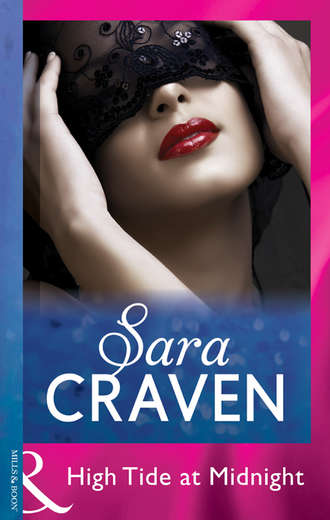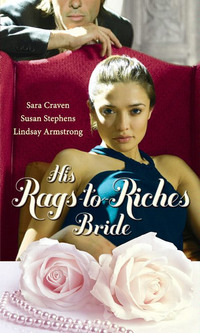
Полная версия
High Tide At Midnight

High Tide at Midnight
Sara Craven

www.millsandboon.co.uk
Former journalist SARA CRAVEN published her first novel ‘Garden of Dreams’ for Mills & Boon in 1975. Apart from her writing (naturally!) her passions include reading, bridge, Italian cities, Greek islands, the French language and countryside, and her rescue Jack Russell/cross Button. She has appeared on several TV quiz shows and in 1997 became UK TV Mastermind champion. She lives near her family in Warwickshire – Shakespeare country.
TABLE OF CONTENTS
COVER
TITLE PAGE
ABOUT THE AUTHOR
CHAPTER ONE
CHAPTER TWO
CHAPTER THREE
CHAPTER FOUR
CHAPTER FIVE
CHAPTER SIX
CHAPTER SEVEN
CHAPTER EIGHT
CHAPTER NINE
ENDPAGE
COPYRIGHT
CHAPTER ONE
‘WELL, I wish to make one thing perfectly clear at the outset. She cannot remain here.’
The new Lady Kerslake’s voice, almost strident in its vehemence, resounded plainly through the closed drawing room door, freezing Morwenna where she stood, her hand already raised to knock. A number of thoughts chased wildly through her head as she assimilated Cousin Patricia’s words—among them that it would be far more honourable to turn and walk away, pretending to herself that she had heard nothing, and that eavesdroppers never heard anything good of themselves anyway, but at the same time she knew that wild horses could not make her budge an inch. And it might be a relief to find out what her cousin really thought, as opposed to the saccharine sweetness she had been treated with up to now.
‘Oh, Mother!’ It was Vanessa speaking now, her voice slightly impatient. ‘You can hardly turn her out on to the streets. She has no training and no qualifications. You know as well as I do that she simply wasted her time at school. What on earth’s she going to do?’
‘That is hardly our responsibility,’ Lady Kerslake returned coldly. ‘She chose to neglect her opportunities. She can hardly complain now if they no longer exist. And it was up to her father to make suitable financial provision while he was alive. He knew quite well what the entail involved.’
‘Perhaps, but he could hardly foresee that he and Martin would both be killed in the same accident. Martin was the heir, after all, and he would have looked after Morwenna.’
Standing motionless in the hall, Morwenna felt a fresh stab of pain inside her at the casual words. But Vanessa was right in a way. No one could have foreseen on that bright autumn day, only a few weeks before, that before night came she would have been quite alone in the world, her father and brother both dead, victims of a freak collision with a lorry whose brakes had failed on the steep hill outside the village.
She had always known that the entail existed, of course. Had even laughed ruefully with Martin over the male chauvinism in this era of Women’s Lib of the insistence that the baronetcy and the estate should still descend through the male heirs only. The future hadn’t filled her with a great deal of concern. She was barely eighteen, after all, and more interested in having a good time than considering her future prospects. And her father had encouraged her in this. Always he and Martin had been there like bulwarks, and she had basked secure in the certainty of their affection and spoiling. Until that day—when the chill wind of reality had shown her how fragile her shelter had been.
The solicitors had been very kind, and had explained everything in great detail, including the fact that there was not a great deal of money for Cousin Geoffrey to inherit. Her father, she learned for the first time, had been speculating on the stock market and suffered some considerable losses. Given time, Mr Frenchard had said, he would have recouped these losses—his business acumen was considerable. Only he had not been given time.
During the weeks since the funeral Morwenna had felt that she was existing in a kind of curious limbo, and this impression had been emphasised with the advent of Cousin Geoffrey, whom she hardly knew, and his rather domineering wife, whom she did.
Cousin Patricia, she knew, had expected to find herself a wealthy woman and had been less than entranced with the true state of affairs, although becoming Lady Kerslake and occupying the house, a gem from the reign of Queen Anne, must, Morwenna surmised drily, have been some consolation at least.
At first she had been inclined to gush over Morwenna, but as the days passed, her manner had become more distant. Not that they had ever been close, Morwenna thought. And she had never been on friendly terms with Vanessa either, even though her father had insisted they attend the same school and had paid both lots of fees to achieve this. She had wondered since whether Vanessa had resented this, or whether her main source of grievance had been simply that her younger cousin had the ability to skate lightly over the academic waters where she had frankly floundered. Whatever the cause, Vanessa’s hostility had at times been almost tangible, and there had been little softening of her attitude since her arrival at Carew Priory. On the contrary, Morwenna felt at times that Vanessa was frankly gloating over the reversal in their fortunes. She’d had to be very careful over everything she did and said, making certain that Mrs Abbershaw the housekeeper went to Cousin Patricia for her instructions, even remembering to knock before she entered rooms where the family had gathered. Suddenly she was the outsider in her own home. Yet no longer her own home, as Lady Kerslake was reiterating with some force.
‘And I can’t imagine why you should be so concerned, Vanessa,’ she added with asperity. ‘You’ve never cared for her particularly.’
‘I don’t care for her now,’ Vanessa retorted waspishly, ‘but we have to consider what people will say, and her father and Martin were extremely well liked locally. We don’t want to start off on the wrong foot.’
‘Indeed not.’ Lady Kerslake gave a deep sigh. ‘What a problem it all is! I had no idea the wretched child was simply going to hang around here aimlessly. Wasn’t there some talk of a painting school?’
‘There’s always talk of something where Morwenna’s concerned. But you’re right, she was supposed to be joining Lennox Christie’s class at Carcassonne this month. Whether he’ll be so keen to have her now that the fees are not forthcoming is a different matter. It’s a well-known fact that he fills up his class with rich dilettantes in order to pay for the pupils he really wants.’
Morwenna’s fingers, clenched deep in the pocket of the loose knitted jacket she was wearing, closed shakingly round the envelope she had thrust there not half an hour before. She had seen the postman coming up the drive from her bedroom window and some premonition had told her what he was bringing, and she had run down to intercept him. All the letters were taken as a matter of course to Cousin Patricia now before they were distributed to the appropriate recipients, and Morwenna knew that a letter with a French stamp would have attracted just the sort of attention that she least wanted.
And her sense of foreboding had been fulfilled. Vanessa might almost be a thought-reader, she told herself despairingly. Lennox Christie’s letter had been courteous but adamant. The work she had shown him at her initial interview in London, he wrote, did not justify him offering her a non-fee-paying place in his class as she had requested. However, he would be back in London in the spring, and she could always contact him then with any new work she had produced, so that he could review his decision. It was the final humiliation. The offer of a review in the spring was, she knew, put in as a salve to her damaged pride.
She had never had a lot of faith in her ability as an artist. She had inherited some of her dead mother’s talent, and had been the prize pupil at school, but she had had few illusions about how she would fare in the fiercely competitive art world if ever her livelihood depended on it. It hadn’t before, of course, and only a sense of utter desperation had prompted her appeal to Lennox Christie. She had sensed during their brief interview earlier that year that he had been unimpressed with the range of landscapes and still life she had shown him, but she knew at the same time that she was capable of better things, if not the touch of genius which had been stamped on so much of Laura Kerslake’s work. She had not mentioned her mother’s name to Lennox Christie. There seemed little point. Laura Kerslake had been dead for over ten years and she had painted little after her children were born. Besides, her work was no longer fashionable.
Cousin Patricia had said as much soon after she had arrived at Carew Priory. Morwenna had little doubt that those of her mother’s paintings which were hanging in the house would soon be relegated to an attic, and replacements sought for them in the trendy gallery in London which Lady Kerslake patronised. She had hoped very much that she would be long gone from the Priory before that happened.
She had never intended to stay there in any case. This was what made it so doubly hurtful to hear herself being discussed as if she was some parasite. She had always known that she would have to get a job of some kind. This was why she had been on her way to speak to Cousin Patricia, to ask, cap in hand, if there was any prospect of a job, however menial, at the trendy gallery. At least she had been spared that particular shame, she thought fiercely.
But that was all she was to be spared. Vanessa was speaking again. ‘And are you sure that she is just hanging around aimlessly? After all, she was seeing quite a lot of Guy a few months ago before all this happened. Perhaps she’s hoping to revive all that again and use him as a meal ticket for life.’
Guy’s mother gave an unfeeling laugh. ‘I can’t believe she’s that naïve,’ she exclaimed. ‘Guy may have paid her attention while Robert and Martin were alive, but the circumstances are different now, very different. Guy isn’t a fool by any means. She’s quite an attractive girl, I’ll grant you that, but if she’s hoping for anything more from him than just a casual affair, I’m afraid she’s going to be severely disappointed. Guy can do better for himself than a penniless cousin.’
Vanessa’s ‘Mother!’ was half laughing, half scandalised, but Morwenna waited to hear no more. She turned precipitately and fled back across the wide hall with its rich Turkey carpet and dark panelled walls, and up the gently curving stairs.
In the past few weeks, one room in particular had become her refuge—her mother’s small sitting room in the West Wing. This was one of the few places where Cousin Patricia and her ‘little changes’ had so far not penetrated. Morwenna slammed the door behind her, then flung herself down on the shabby brocaded sofa and gave way to a storm of tears. In a way, it was a catharsis she had been needing. She had hardly shed a tear at the funeral or afterwards, and had meekly accepted the tranquillisers that the doctor, worried by her pale face and shuttered eyes, had prescribed.
Now grief, humiliation and rage all had their way with her, as she lay, her face buried in the silken cushions. It was dreadful to contemplate how near, how very near she had come to falling in love with Guy. As children, they had been largely indifferent to each other on the few occasions they had met. Then, in the early summer, she had met him again at a party after a gap of several years. In fact they had hardly recognised each other, but the attraction had been, as she thought, instant and mutual. Now she had to face the fact that she had been the one who was attracted, and that Guy had only had an eye to the main chance. She pressed her knuckles against her teeth until they ached.
So many things began to make sense now, particularly the fact that she had seen so little of Guy since the funeral. True, he had been working, and only came down to the Priory at weekends, but even then he had held aloof. She had been grateful then, telling herself that it was respect for her grief that held him in check, but now she knew differently. It was simply that Guy had nothing to gain now in prolonging their relationship. She could only be thankful that she had never yielded to the frank temptation to turn to his arms for comfort.
She had sometimes wondered in the past why it had always been Guy who had drawn back in their lovemaking. There had been several times when she had longed for his kisses and caresses to sweep her away on a tide of passion past the point of no return. Now she wondered if it had been self-control which restrained him, or simply a disinclination to get too closely involved with her. Whatever his motive, it had been enough to keep her eating out of his hand all through the summer, she thought unhappily. In fact, she had come close to quarrelling with Martin on the subject. Martin had been unimpressed with Guy’s blond good looks, and had disliked his sense of humour which tended to poke sly fun at everyone outside the charmed circle in which he moved.
Guy was one of the few subjects they had disagreed on, and now she had to acknowledge that Martin had not simply been playing the heavy brother. He had been wiser than she knew, and she understood his motives now in encouraging her to apply for a place on the painting course. Apart from wanting to get her out of Guy’s way, he had been concerned about her lack of purpose in life, her lighthearted assumption that there would always be someone around to look after her. She was quite aware, without conceit, of her own attractions and knew there were few men who would not be drawn by her pale silky hair, twisted up into a loose knot on top of her head, and her large grey eyes with their long fringe of dark lashes. She supposed now that this was why she had been so easily taken in by Guy. She was accustomed to men’s attentions and admiration, and it had never even occurred to her that her good-looking cousin could have an ulterior motive.
‘What a fool!’ she whispered aloud, pressing her knuckles childishly against her streaming eyes. ‘What an utter fool!’
At last she lay quietly, her eyes closed, capable only of an occasional aching sob. She felt physically and emotionally drained, and she was scared as well. One certain thing had emerged from the unpalatable comments she had heard downstairs—she was going to have to leave the Priory, and fast. But where was she to go? Even the potential refuge of the painting school had been taken from her, and the remnants of her pride forbade her to ask for any kind of help from Cousin Patricia.
She sat up unwillingly, pushing her tumbled hair back from her face, while her brooding gaze travelled round the room, resting with a kind of painful affection on the few pieces of antique furniture that she knew her mother had chosen for this room when she had first come to the Priory as a bride. The fact that the chair covers were faded and the curtains and carpet had also seen better days only added to their charm. Above the white marble fireplace hung Laura Kerslake’s only attempt at a self-portrait, painted only a few years before her death. Morwenna’s eyes lingered on it with peculiar intensity, as if that serene face with the humorous eyes and the wryly twisted mouth, suggesting that the artist knew only too well that portraiture was not her forte, could provide her with some clue what to do for the future. She gave a small weary sigh at her own fancifulness, and her eyes wandered on past the portrait to the small group of landscapes on the adjoining wall.
Here, Laura Kerslake had been thoroughly at home. These were what Morwenna had always thought of as the Trevennon group. They were scenes done from memory of the place where Laura had spent her girlhood. Although she had been born and lived in London during her early years, the outbreak of the Second World War had caused her parents to seek a safer home for her, and so Laura, on the brink of her teens, had made a long, solitary journey to Cornwall to stay with some distant relatives. She had never returned to London. When the news had come that her mother and father had been the victims of a direct hit on their house during the Blitz, she had simply remained at Trevennon.
Trevennon. Morwenna climbed off the sofa and walked across the room to study the pictures more closely. Of all her mother’s work, these seemed more deeply imbued with the almost mystical, fey element which characterised it than any others. When she was small, Morwenna had gazed at the big, dark house on the cliff top with its twin turrets and tall, twisted chimneys and set her young imaginings of Camelot, of Tristan and Iseult among those sombre stones. Laura had laughed indulgently at such fancies, although at the same time she had pointed out that Trevennon owed more to the tin-miners than it did to any fabled knights and ladies.
Morwenna knew that the rugged coast nearby was littered with the remains of the mine-workings, and the ruined buildings and chimneys stood now only as the landmarks of a vanished prosperity. Trevennon, her mother had said, had been founded on that prosperity, but Laura had never given any hint as to what it owed its present subsistence.
In fact, when she looked, back, Morwenna realised that her mother had said very little about her life in Cornwall. But she had been happy there, or that was the impression Morwenna had always received. Besides, her own name was a Cornish one, and her mother would hardly have chosen it if it had revived any unhappy memories, although at the same time she was aware that her father had not approved the choice. ‘Pure romanticism’, he had called it, but with an edge to his voice rather than the indulgent note with which he usually greeted his wife’s whims. And he had used the same phrase, Morwenna remembered, when he had looked at the Trevennon group—the house on the cliff-top, the deserted Wheal Vaisey mine, the tiny harbour village of Port Vennor, and the cramped beach of Spanish Cove with the dark rocks standing up like granite sentinels against the swell of the tide.
‘Why do you say that?’ As if it were yesterday, Morwenna recalled the lift of her mother’s chin. ‘I wasn’t just painting a place. I was painting my youth, and all I knew then was peace, security and love.’ She had risen from the sofa and walked over to her husband, sliding her arm through his and resting her cheek against his sleeve. ‘I don’t doubt that you’re right, but leave me my illusions.’
‘Peace, security and love.’ As the words came back to her, Morwenna felt herself shiver. They were like an epitaph for her own hopes, she thought unhappily. Then she stiffened. A purposeful step was coming along the passage outside, and she turned to face the door as it opened. Lady Kerslake came in.
‘Oh, there you are, Morwenna. I’ve been looking all over the house for you,’ she said rather pettishly. ‘I was wondering whether you intended being in for lunch.’ She hesitated, then went on, ‘You see, Guy has just phoned to say that he’s coming down and bringing a friend with him and we thought….’ She let the words drift into silence and gave Morwenna a significant look.
Morwenna bit her lip. So Guy was bringing his latest fancy down to lunch, and his mother was checking to see that their inconvenient house-guest would accept the situation without showing that she cared, or making any kind of scene. Her temper rose slowly.
‘How nice,’ she said with assumed indifference. ‘But if my presence is going to cause any embarrassment I can easily pick up a snack at the Red Lion.’
‘Oh, my dear!’ Lady Kerslake’s lips parted in a smile of total insincerity. ‘As if we would expect you to do any such thing! What a silly girl you are, sometimes. Not, of course, that we would wish to interfere if you had made any plans. After all, you’re a grown woman now, and you have a life of your own to lead. It’s perfectly natural that you should want to be independent, and we don’t want to interfere, or feel that we’re holding you back in any way.’ She paused again, invitingly, as if waiting for Morwenna to confide in her. Her tone had been all interest and motherly concern, but Morwenna knew she would not have been deceived for an instant, even if she had not overheard that brief conversation in the drawing room. Cousin Patricia’s whole tone and attitude was hinting broadly that she had outstayed her welcome, and that they were waiting to hear what plans she had made to shift herself.
The humiliation of having to admit that she had no plans, and that even her embryo career as an artist had died an undistinguished death, was suddenly too much to bear. A germ of inspiration lodged in her brain, and before she could reason with herself or question the wisdom of what she was about to do, she spoke.
‘You really don’t have to bother about me any more, Cousin Patricia. I’d intended to tell you over lunch that I’m going away. I—I’ve been invited to stay at Trevennon—with my mother’s people—until I go to Carcassonne in the spring. The letter came this morning. It’s a wonderful opportunity for me. Cornwall’s a marvellous place for painters. My mother used to say that she got all the inspiration for her best work from her time at Trevennon,’ she ended, rushing her words nervously, as the thought occurred to her that Cousin Patricia might demand to see this mysterious invitation.
Lady Kerslake’s eyes rested wonderingly on the group of paintings over Morwenna’s shoulder, then came back to search her face rather frowningly. ‘Your mother had relatives in Cornwall? I wasn’t aware….’
‘Very distant relatives,’ Morwenna broke in. ‘Cousins heaven only knows how many times removed.’ Wildly she searched her memory for names that would add weight to her story. ‘It—it was Uncle Dominic who wrote to me.’ That was the name her mother had mentioned most of all. Dominic Trevennon who had taught the city-born girl to climb barefoot over the rocks, to row a boat, to fish, to lift the lobster pots and relieve them of their snapping contents. It had been Dominic too who had told her the legends that Morwenna remembered as bedtime stories. Tales of the ‘knackers’, the small malevolent spirits who inhabited the tin mines, whose tapping hammers presaged disasters, such as flooding or earthfalls. Tales of the galleon which had foundered off Spanish Cove during the storms that pursued the ill-fated Armada, and the gold it had carried, still to be found, Laura had said, among the sand of the cove by anyone reckless enough to climb down the cliff to search there and risk being cut off by the racing tide. And Morwenna had lain there round-eyed among the comfort of the blankets, hearing the screech of gulls and feeling the sand gritty under her bare toes as she delved among the shifting grains for the doubloons.
‘It all seems very sudden,’ Lady Kerslake was saying, her lips drawn into a thin line. ‘But I suppose you know what you’re doing. Have you met any of these—er—cousins before?’
‘No, but I feel I know them. My mother told me so much about them.’ Morwenna, guiltily conscious just how far this was from the truth, surreptitiously crossed her fingers in her jacket pockets.
‘Well, it’s very kind of them to offer you a home, under the circumstances,’ Lady Kerslake said sourly. ‘I do hope you won’t take advantage of their generosity, Morwenna. You can’t expect to be a burden on other people all your life, you know. But if it’s only until the spring, I don’t suppose it will matter too much.’ She gave a brisk nod. ‘Now, what about lunch?’
‘Oh, don’t bother about me.’ Morwenna’s nails dug deep into the palms of her hands. ‘I think I’ll go and see about my packing.’ Another meal in this house, she thought, would choke me.











